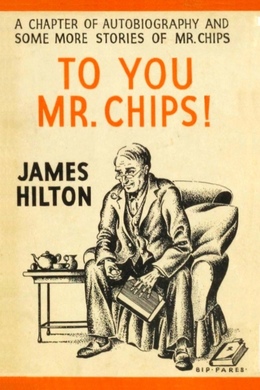
-
EPUB 172 KB
-
Kindle 219 KB
-
Support epubBooks by making a small $2.99 PayPal donation purchase.
This work is available for countries where copyright is Life+70 or less.
Description
More stories of Mr. Chips, the world’s most beloved schoolmaster, as he helps shape young lives through the first half of a tumultuous centuryWhen author James Hilton penned his beloved short novel, Goodbye, Mr. Chips, he drew on his own formative experiences at a boarding school in Cambridge. As World War I approached, the camaraderie among students and the faculty’s courage helped Hilton and his classmates face the fear and deprivations of those troubled times. In this collection, Hilton adds to the legend of Mr. Chipping through exquisite short stories, while also providing a warm autobiographical account of his own experience with the English public school system.
137 pages with a reading time of ~2.25 hours (34311 words), and first published in 1938. This DRM-Free edition published by epubBooks, 2015.
Community Reviews
There are currently no other reviews for this book.
Excerpt
If I use the word ‘I’ a good deal in these pages, it is not from self-importance, but because I would rather talk about my own schooldays than generalise about school. Schooling is perhaps the most universal of all experiences, but it is also one of the most individual. (Here I am, generalising already!) No two schools are alike, but more than that–a school with two hundred pupils is really two hundred schools, and among them, almost certainly, are somebody’s long-remembered heaven and somebody else’s hell. So that I must not conceal, but rather lay stress on the first personal pronouns. The schools I write of were MY schools; to others at the same schools at the same time, everything may have been different. I went to three schools altogether–an elementary school, a grammar school, and a public school. I matriculated at London University and spent four years at Christ’s College, Cambridge. Thus, from the age of six, when my mother led me through suburban streets for presentation to the headmistress of the nearest Infants’ Department, up to the age of twenty-three, when I left Cambridge supposedly equipped for the world and its problems, the process called my education was going on. Seventeen years–quite a large slice out of a life, when you come to think about it. And yet the ways I have earned my living since–by writing newspaper articles, novels, and film scenarios–were not taught me at any of these schools and colleges. Furthermore, though I won scholarships and passed examinations, I do not think I now remember more than twenty per cent of all I learned during these seventeen years, and I do not think I could now scrape through any of the examinations I passed after the age of twelve. Nor was there any sort of co-ordination between my three schools and the university. For this, nobody was to blame in a free country. To some extent, I learned what I liked; to a greater extent, my teachers taught me what they liked. In my time I ‘took,’ as they say, practically every subject takable. At the elementary school, for instance, I spent an hour a week on ‘botany,’ which was an excuse for wandering through Epping Forest in charge of a master who, in his turn, regarded the hour as an excuse for a pleasant smoke in the open air. The result is that Botany to me today stands for just a few words like ‘calyx,’ ‘stamen,’ and ‘capillary attraction,’ plus the memory of lovely hours amidst trees and bracken. I do not complain. Again, at the grammar school I spent six hours a week for three years at an occupation called ‘Chemistry,’ and all these hours have left me with nothing but a certain skill in blowing glass tubes into various shapes. In mathematics I went as far as the calculus, but I do not think I could be quite sure nowadays of solving a hard quadratic equation. Of languages I learned (enough to pass examinations in them) Latin, Greek, French, and German. I suppose I could still read Virgil or Sophocles with the help of a dictionary, but I do not do so, because it would give me no pleasure. My French and German are of the kind that is understood by sympathetic Frenchmen and Germans who know English. The only school-learning of which I remember a good deal belongs to English Literature, History, and Music; but even in these fields my knowledge is roving rather than academic, and I could no longer discuss with any degree of accuracy the debt of Shakespeare to Saxo- Grammaticus or the statute De Heretico Comburendo. In fact, although I am, in the titular sense, a Scholar of my college, I do not feel myself to be very scholarly. But give me a new theory about Emily Brontë or read me a pamphlet about war and peace, and I will tell you whether, in my view, the author is worth listening to. To make up for all I have forgotten, there is this that I have acquired, and I call it sophistication since it is not quite the same thing as learning. It is the flexible armour of doubt in an age when too many people are certain. What all this amounts to, whether my seventeen years were well spent, whether I am a good or a bad example of what schooling can do, whether I should have been a better citizen if I had gone to work at fourteen, I cannot say. I can only reply in the manner of the youth who, on being asked if he had been educated at Eton, replied: ‘That is a matter of opinion.’
